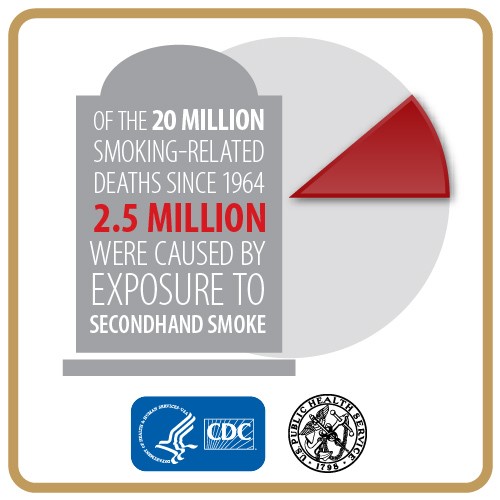Secondhand Smoke (SHS)
Secondhand smoke is harmful and can cause serious health problems like:
- Heart disease, heart attacks, and strokes
- Lung diseases and lung cancer
- Other types of cancer
For babies and children, being around secondhand smoke can lead to:
- Breathing issues and lung infections
- Ear infections
- Learning and behavior problems
Pregnant women exposed to secondhand smoke are more likely to have:
- Babies born too early or too small
- Babies who die from Sudden Infant Death Syndrome (SIDS)
What Is Secondhand Smoke?
Secondhand smoke comes from:
- The burning end of a cigarette or other tobacco product
- The smoke breathed out by someone smoking
- There's also secondhand aerosol from e-cigarettes or vapes. This cloud looks like smoke and contains harmful chemicals.
Why It Matters
Secondhand smoke causes many preventable illnesses and deaths. Banning smoking indoors helps:
- Protect people from smoke
- Encourage smokers to quit
- Stop young people from starting to smoke
- Many people who smoke quit to keep their loved ones safe from secondhand smoke.

The 2014
Surgeon
General's Report
added stroke to the health problems known to be
caused by SHS. Get more
facts
about SHS
.
Secondhand Smoke and Smoking During
Pregnancy Expose Infants and Young Children to Lead
Smoking and Lead
Exposure in NC Children 2019 (From Duke University’s
Environmental Law and Policy Clinic)
(PDF, 5.6 MB)
The Surgeon General’s Report on Involuntary
Exposure to Tobacco Smoke (2006)
The U.S. Surgeon General released a report in 2006 called
The Health
Consequences of Involuntary Exposure to Tobacco Smoke
which
explains all the known health risks of SHS and states, "there is no
known safe level of exposure to SHS."
Major Conclusions of the Surgeon General's Report
-
SHS causes premature death and disease in children and in adults who
do not smoke.
-
Exposed children have increased risk for:
- Sudden infant death syndrome (SIDS)
- Acute respiratory infections
- Ear problems
- More severe asthma
-
Parents' smoking impacts their children by:
- Causing respiratory symptoms
- Slowing lung growth
-
Exposing adults to SHS causes:
- immediate adverse effects on the cardiovascular system
- coronary heart disease
- lung cancer
-
The scientific evidence indicates that there is no risk-free level
of exposure to SHS.
-
Many millions of Americans, both children and adults, are still
exposed to SHS in their homes and workplaces.
-
Eliminating indoor smoking fully protects nonsmokers from exposure
to SHS.
-
Separating smokers from nonsmokers, cleaning the air and ventilating
buildings cannot eliminate exposure to SHS.